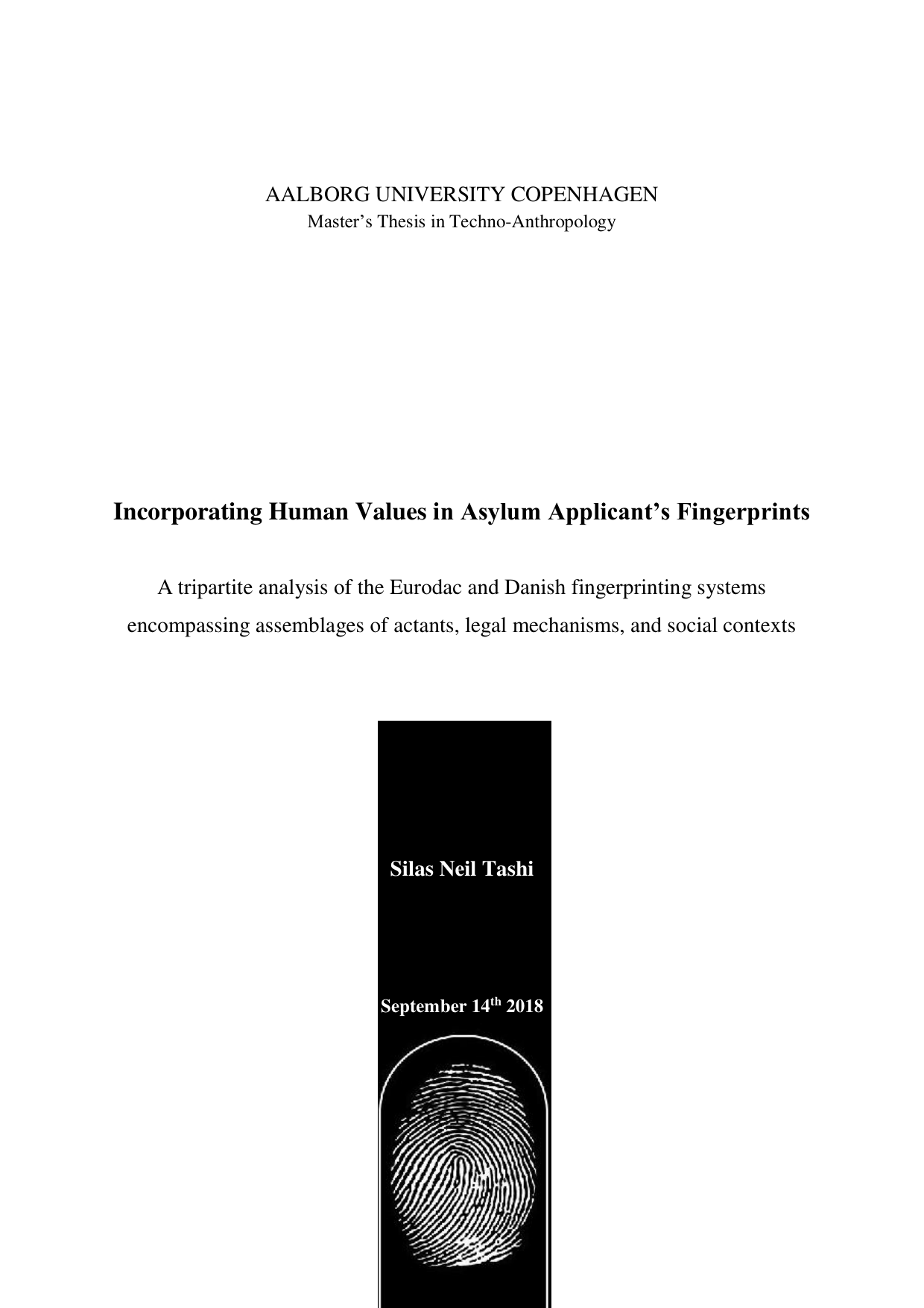
Incorporating Human Values into Asylum Applicant's Fingerprints: A tripartite analysis of the Eurodac and Danish fingerprinting systems encompassing assemblages of actants, legal mechanisms, and social contexts
Translated title
Inddragelse af menneskelige værdier i asylansøgerens fingeraftryk: En treparts analyse af Eurodac og det danske fingeraftrykningssystemer, der omfatter samlinger af aktører, juridiske mekanismer og sociale kontekster
Author
Term
4. term
Education
Publication year
2018
Submitted on
2018-09-14
Pages
109
Abstract
På baggrund af den "Europæiske Flygtninge krise", og den fallit som Europa Parlamentets flygtninge politik har vist sig at resultere i, udspilles debatten om Dublin Forordningen og det kontroversielle elektronisk fingeraftryksregister Eurodac. Til den teoretiske diskussion som også spænder over filosofiske betragtninger om magt, overvågning og bio politik, vil denne opgave forholde sig til flygtninge politik som den opleves af asyl ansøgere i Danmark. Mit udgangspunkt er emperisk og baseret på en kombination af Actor network Theory (ANT) samt Capability Approach (CA) og perspektiveret ved Value Sensitive Design (VSD). ANT befordrer flygtning som aktør i den mulige tilsynegørelse der forledes i registrerings processen. Ved at forholde aktør til CA undersøges de kompetencer som udvikles i forbindelse med ophold og proces. Slutligt i opgaven forsøger jeg at forholde mine emperiske funderede overvejelser som human/etisk aspekt til den teknologiske design proces. Det vil blive foreslået at Nationale sikkerheds politik i den Danske kontekst tager præcedens over etisk stillingtagen og humane hensyn, med det resultat at asylansøger efterlades i en prekær position. De fulde konsekvenser af Eurodac som registrerings procedure er problematiske i en digital/globaliseret verden og tilsidesætter asylansøgers ultimative behov for beskyttelse. I denne sammenhæng vil jeg i opgaven foreslå etisk funderede, teknologisk innovation som i udformning tager hensyn til de humane aspekter af flygtninge og deres kår.
In the wake of the ‘European migration crisis’ and the arguably calamitous mismanagement by the EU Member States, the rather esoteric implementation of the Eurodac Regulation has not been without its controversies. Ranging from the publicized contentions over the Dublin Convention to the more philosophical debates concerning biopolitics, this paper seeks to further the discussion in an explorative manner from the perspective of asylum applicants in Denmark. The research herein is motivated by a theoretical undertaking combining Actor-Network Theory (ANT) with a Capability Approach (CA) which is then evaluated through a Value Sensitive Design (VSD) epistemology. In so doing, ANT is utilized to map out the inherent actors that make themselves visible in the process of associating with the issue. The CA is thereafter called upon as the method through which to raise an understanding of the values and capabilities that the asylee’s consider to be important. Finally, a Value Sensitive Design approach is utilized in an effort to embrace potential suggestions of these human values into the design process of technology. It will be argued that, in the case of Eurodac and its’ implementation in Denmark, security concerns take primacy over ethical considerations, impacting on one’s privacy, sense of autonomy, and respect for the well-being of the person seeking protection. Furthermore, and regardless of which side of the digital fence one is situated, the collection, enrolment, processing, and dissemination of asylum applicant fingerprints has wide-ranging implications for both direct and indirect stakeholders. Finally, points of intervention are suggested that are undemanding and technically feasible and which seeks to redress the imbalance.
Keywords
Documents
